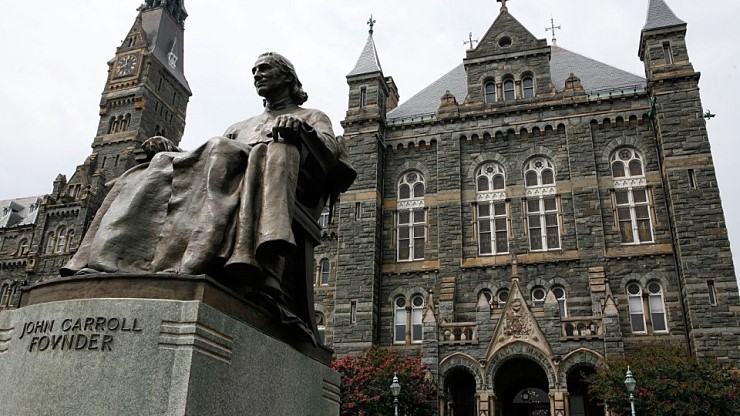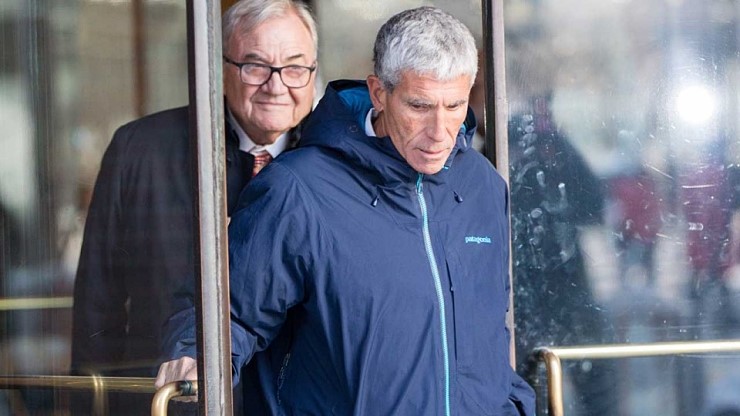 |
| ▲ Georgetown University was involved in the college admissions bribery scandal. (Photo from SBS news) |
College entrance examinations became a hot issue in Korea after the airing of the drama ‘SKY Castle’, a show where residents on the fictional community went to great lengths to see their children accepted to Seoul National University. Recently, the U.S. society was rocked by a college admissions bribery scandal that enabled many wealthy parents and celebrities to enroll their children in prestigious universities such as Stanford, Yale, and UCLA by falsifying their applications. On March 12th, 50 people including 33 celebrities were indicted for manipulating college entrance exam records and student sporting profiles, so that their children could gain acceptance to these prestigious institutions. Some colleges, including UCLA and Stanford, fired the sports coaches involved in the scandal and launched their own internal investigations. These facts are all eerily similar to the lengths wealthy parents went to in the drama ‘SKY Castle’ to enable their kids to attend a prestigious institution.
 |
| ▲ There was a big admission scandal in America. (Photo from sedaily.com) |
According to U.S. prosecutors, the scandal involves approximately 25 million dollars being exchanged between parents and their “admission consultants”, college admission coaches, and managers of admission in schools dating back as far as 2011. William Singer, head of Edge College and Career Network illegally helped students get into the colleges they wanted. He used a third person to make his scheme work. Mark Ridell was hired by Singer to take and switch test sheets with student applicants, leading to a higher score. He was able to get away with this because Singer bribed the exam supervisor before the test even started. Singer switched the SAT and ACT test papers with ones written by Ridell because they are very important grades for admissions. Also, in the case of athletic students, he lied about their sporting experience in order to make sure they were accepted. College athletic coaches received secret payments to cover up the illegal activity. The singer was able to get away with this for a while because parents were covering up their payments by donating money to a fake charity foundation called Key Worldwide. According to CNN, some parents sent money to the fake charity foundation and even got a tax rebate for their “donation”.
There are two reasons for this college admission bribery scandal was able to flourish. The first one is the hand-me-down of wealth and hierarchy that exists in society. According to a survey conducted by Harvard University in 2013, if a student applies to a university where their parents had graduated, his or her chances of gaining acceptance was 45.1 percent higher than that of ordinary applicants with the same grades. This proves the prevalence of a ‘Donor Admission’, the system where children are accepted to their university of choice because parents donate huge sums of money or aid in building new structures at the school. The second cause is the expansion of the admission consulting market in the USA. According to an article from the Los Angeles Times, the number of admissions consulting firms have increased fourfold in 2018, from the number recorded in 2015. In fact, IBIS World announced that the scale of this market is becoming so huge that last year it approached two billion dollars with more than 40 thousand people working in this field. The consultants provide feedback and write letters of self-introduction or resume for their clients in exchange for fees ranging from 2,000 to 1 billion dollars. Children of celebrities from Silicon Valley also used these admission consultants. John Doerr, founder of the top venture investment company, Kleiner Perkins(KP)’s was even a client of the scandal-ridden Singer.
 |
| ▲ Felicity Huffman, facing possible prison time, pleads guilty in college admissions scandal. (Photo from BBC news) |
To learn more about the ‘illicit admission’ scandal, the Dankook Herald conducted an interview with Christopher Henry Lange, a professor in the Department of British and American Humanities at Dankook University. We asked Professor Lange about the root cause of this scandal and how serious the competition for college entrance in the U.S. is these days. He answered, “The main reason is the desire of parents who want to validate their social standings through their children’s perceived educational success. It is becoming a much more serious issue these days. Parents, particularly in the upper class, are pushing their children to academies to take higher education as early as pre-kindergarten age”. Secondly, when we asked about how the USA usually deals with illicit admission, he said, “Currently, the courts enforce penalties on the parents involved, rather than the children who benefitted from the corrupt behavior of their parents. Penalties can result in fines and possible jail time.” Last but not least, he explained that both Korea and the U.S. have a form of standardized testing, such as the SAT in the US or CSAT in South Korea. Though some differences lie in the competition involved in preparation for admission into universities, both countries are struggling from tremendous pressure and stress because of these college admissions tests. Moreover, he emphasized that there are concerns that such pressure is having a strong negative effect on the emotional stability of the children due to higher stress levels.
This incident shows that corrupt admission problems are not just a matter for Korea, but also the entire world. The impact of this scandal is expected to be felt across American society, as corruption based on bribery gives a sense of relative deprivation to parents and their children who were trying to enter university the normal way. As Professor Lange mentioned, the excessive pressure on students to excel should be seriously reconsidered. Most of all, it is critical to come up with a practical solution to ease the fierce competition for all college admissions.
김동은, 김도현, 남윤경, 서채원 dankookherald@gmail.com

 Vote for the Campus Brand Naming!
Vote for the Campus Brand Naming!

![[Campus Magnifier] Let's Surf the Library!](/news/thumbnail/202404/12496_1765_4143_v150.jpg)




